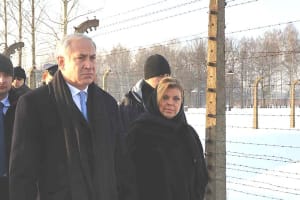The Rifman Law: Integrating Bedouin society and transforming the Negev

For centuries, Bedouins have inhabited the Negev, a vast desert region in southern Israel that makes up two-thirds of the country's landmass. The Negev is renowned for its rich archaeological and historical heritage, which scientists believe is crucial for understanding human history and development
Historic trade routes, such as the Incense Route that once connected the Arabian Peninsula to the Mediterranean Sea, are among the notable findings from thousands of years ago, as well as the remnants of ancient cities such as Avdat and Shivta and 2,500-year-old tombs, lying at the crossroads of early trade routes.
Over 300,000 Bedouins currently reside in the Negev. In spite of their prolonged history there, the Bedouin community, a semi-nomadic people group, has been faced with many challenges and struggles. More specifically, in modern times, they have been confronted with issues related to land ownership, governance, education, economic development and security. Even though the Bedouin community has played a significant role in the Negev's history, it is frequently left out of discussions regarding current policies.
In light of the challenges and struggles faced by the Bedouin communities residing in the Negev, The Rifman Institute, named after the visionary Shmulik Rifman, has initiated a groundbreaking legislative framework called the "Rifman Law" to address the ongoing issues these communities encounter.
The late Shmulik Rifman, a respected leader and former head of the Ramat Negev Regional Council, devoted his life to developing the Negev. As chairman of the Regional Negev Development Authority and the Center for Regional Councils in Israel, he achieved significant milestones. His main vision was to create a harmonious, prosperous Negev that embodies the Jewish and the Bedouin communities working together toward common goals.
The Rifman Law is a comprehensive legislative proposal developed by legal experts and researchers at the Rifman Institute over three years.It aims to address the many challenges faced by the Bedouin community and assist in their integration into the socio-economic fabric of the Negev. The main components of the proposal include land regulation, local governance reforms, educational initiatives, economic development, and enhanced security measures.
One of the most sensitive and critical issues remains the land regulation and ownership. The Bedouin community faces ongoing challenges regarding their land rights. Many live in unrecognized villages without legal land rights, leading to frequent disputes and demolitions.
The Rifman Institute's proposal will grant local authorities the power to regulate land. Within their jurisdictions, alongside an independent planning committee, both temporary and permanent permits will be granted and a push for sustainable development will be made. A major key to the proposal entails converting disputed land ownership claims into development rights, which will allow Bedouins to utilize the land without full ownership. This solution seeks to resolve long-standing conflicts with state institutions.
The Bedouin Settlement Authority has been tasked with addressing land settlement and ownership issues for many years now. Nevertheless, reports from the Knesset Research and Information Center highlight significant underperformance.
Beyond the land issues lies the question of governance. The proposal by the Rifman Institute introduces the creation of a new position: An assistant manager with the authority to implement the agency’s objectives and establish policies in line with legal requirements. The proposal also suggests that the Eshkol Negev Regional Corporation oversee services funded by a portion of the proceeds from state land sales, with the aim of financing municipal services for residents in unregulated areas.
Education is another challenge for the Bedouin community. The proposed legislation aims to create a specialized and dedicated education network. This initiative opens a door to education services for unregulated areas. Experts at the Rifman Institute give special attention to the selection of teachers, recommending measures to prevent employing teachers from the Palestinian Authority, to ensure the integration of the Bedouins into the Israeli society.
The program’s authors encourage legislation to be the pillar of each economic project. As outlined in the proposal, incentives for capital investments, professional and vocational training, and education, as well as the efficient use of the land resources, will be implemented through the law with the goal of increasing the municipal and personal wealth of the Bedouin community.
Security is a major concern. The Rifman Institute's strategy involves establishing a policing model for the southern district that encompasses the entire Bedouin community in the Negev, regardless of their settlement. This model recommends increased urban policing and arrests for weapons offenses, potentially involving the Israeli Security Agency (Shin Bet), if necessary.
Collaboration among government entities, local authorities, businesses, and non-governmental organizations is crucial for the Rifman Law to be effective and sustainable.
Despite criticism, the Rifman Institute highlights the need for community feedback and participation, while rejecting the alleged lack of Bedouin involvement in its development. Engaging Bedouin leaders and residents in the implementation process is crucial for achieving lasting change.
If implemented, the Rifman Law could transform the Negev into a thriving region. Nevertheless, many challenges remain, including political opposition, resource allocation, and obtaining community backing in the Israeli and Bedouin society. Respecting civil liberties while balancing development and security, will be essential to the law's success.
The Rifman Institute's vision highlights the need for development that respects Bedouin culture and traditions while safeguarding their unique heritage. The Institute's goal is to create a harmonious Negev for all its residents.
In response to the urgent need for reform, Hagai Raznik, head of the Rifman Institute, stated: “We are obliged to insist and fight to produce legislative solutions. We can no longer continue with the neglect of the Bedouin society.”

The All Israel News Staff is a team of journalists in Israel.
You might also like to read this:














